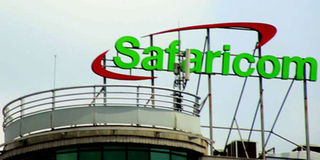Covid-19: Safaricom pledges Sh200m

Safaricom headquarters on Nairobi's Waiyaki Way. PHOTO | FILE | NATION MEDIA GROUP
What you need to know:
- The telco says the cash brings its total contributions in kind and cash to date to Sh5.7 billion.
Safaricom has committed Sh200 million to provide food and nutrition to Kenyans in need as part of its contributions to the Covid-19 emergency fund.
The telco says the cash brings its total contributions in kind and cash to date to Sh5.7 billion.
Other corporates that have announced their contributions recently include the National Business Compact Coalition, Kenya, which gave Sh70 million.
The donation, which is in both cash and kind, was raised by Reckitt and Benckiser, PZ Cussons, Live Ad, Unilever, Menengai, Copia, Rotary International, Johnson and Johnson, Swiss Development Cooperation (SDC), Twiga, Chandaria, and Microsoft.
Devki Group gave Sh20 million cash and oxygen valued at Sh100 million. Others are Ecobank (Sh10 million), Sanlam (Sh10 million) and UBA Kenya (Sh15 million) among others.
The United States government also announced an additional Sh52.9 million ($500,000) investment for training health workers in its support of Kenya's efforts to combat coronavirus, bringing its total aid to Sh106 million ($1 million).
The US Agency for International Development (USAID) will implement the response strategy in collaboration with the Ministry of Health and county governments.
US Ambassador Kyle McCarter said his government is committed to working with Kenya to respond, treat, and recover from the pandemic.
"The US Government has worked with Kenyans for the last 55 years to mitigate the spread of infectious diseases, such as HIV, tuberculosis and malaria," he said.
The Independent Electoral and Boundaries Commission (IEBC) has contributed Sh1.2 million to the emergency fund while the Visa Oshwal Community made its third food donation to 52 different groups on Tuesday which caters for street children, orphans, abused women's groups, the physically challenged and the elderly by giving them a week's supply of food items.
On its part, Chandaria Industries partnered with the National Youth Council in contributing donations worth Sh2.7 million. The company donated 10,000 facemasks worth Sh1 million, liquid hand wash also worth Sh1 million and tissue paper worth Sh700,000.
Safaricom says following the request President Uhuru Kenyatta for emergency resource mobilization towards containing the spread and impact of the Covid-19 pandemic, it will give the cash through its M-Pesa and Safaricom Foundations.
The firm says the financial commitment adds to its ongoing initiative enabling customers to redeem Safaricom Bonga Points to pay for essential goods and donate their points to those in need as a show of goodwill during this period.
To date Kenyans are redeeming an average of 20 million points a day under this initiative.
"We have made business decisions that will enable our customers access more of our products and services for at either no cost or at a highly subsidized rate. These decisions will ensure Kenyans spend their money where they need it most," Safaricom Chief Executive Officer Peter Ndegwa, said in a statement on Wednesday.
Ndegwa added that Safaricom had also made business decisions in the last three weeks since Kenyans were asked to stay at home to enable its customers access more products and services either for free or at a highly subsidised rate.
"Safaricom continues to implement measures to cushion customers and Kenyans at large from negative impact, currently valued at Sh5.5 billion, the firm said.
These include zero rating sending money from one person to another for transactions below Sh1,000 for three months to reduce the risk of handling cash.
It has also zero-rated Paybill tills for government hospitals and dispensaries., doubled bandwidth offered on fibre connections to home, giving customers an opportunity to work and learn from home and to get entertained.
It says it has also provided concessional rates for data access to specific educational content for various universities and other learning institutions.
The Safaricom Foundation has also donated thermal cameras worth Sh10 Million to the Ministry of Health installed that are in various entry points to the country.
"Safaricom has further supported the government in the establishment and operation of a 24-7 COVID-19 Information Centre, leveraging the capabilities of our Customer Contact Centre. We are also hosting over 300 doctors to support the frontline staff in educating, informing and managing the spread of Covid-19," the firm said.
"Today we all face a common enemy. We can only win by supporting each other and standing with the less fortunate in our society. I urge us all to make a difference by contributing be it in cash or in kind towards supporting those among us in need," Ndegwa added.
On its part, Ecobank Kenya said money will be channeled through the recently formed Covid-19 Emergency Response Fund.
"As part of the community, we are happy to support the Government's call for all of us to unite in containing a pandemic that continues to ravage our society. We believe that our contribution will go a long way in supporting the purchase of the much-needed medical facilities and crucial equipment necessary for the containment of this disease," Ecobank Kenya MD Cheikh Travaly said in a statement.
Sanlam Kenya CEO Patrick Tumbo said the firm is highly conscious of the fact that the prevailing situation is totally unprecedented and that the country has found itself needing to deal with a large-scale health and social behaviour change intervention.
"We recognise that there are people with urgent medical needs following circumstances precipitated by rising positive Covid-19 cases, the need to comply with the inter-county travel restriction, national curfew and practice social distancing, among other personal hygiene protocols," said Tumbo noting that during this critical period, it was important to take care of each other to ensure the health and safety of families, friends, colleagues and communities.
Report by Paul Wafula, Sarah Nanjala and Brian Okinda



